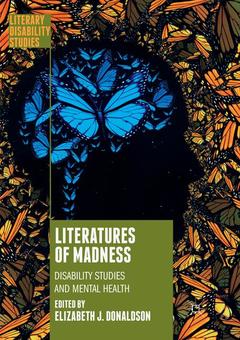Description
Literatures of Madness, Softcover reprint of the original 1st ed. 2018
Disability Studies and Mental Health
Literary Disability Studies Series
Coordinator: Donaldson Elizabeth J.
Language: English
Subject for Literatures of Madness:
Publication date: 01-2019
Support: Print on demand
Publication date: 08-2018
Support: Print on demand
Description
/li>Contents
/li>Biography
/li>Comment
/li>
Literatures of Madness: Disability Studies and Mental Health brings together scholars working in disability studies, mad studies, feminist theory, Indigenous studies, postcolonial theory, Jewish literature, queer studies, American studies, trauma studies, and comics to create an intersectional community of scholarship in literary disability studies of mental health. The collection contains essays on canonical authors and lesser known and sometimes forgotten writers, including Sylvia Plath, Louisa May Alcott, Hannah Weiner, Mary Jane Ward, Michelle Cliff, Lee Maracle, Joanne Greenberg, Ann Bannon, Jerry Pinto, Persimmon Blackbridge, and others. The volume addresses the under-representation of madness and psychiatric disability in the field of disability studies, which traditionally focuses on physical disability, and explores the controversies and the common ground among disability studies, anti-psychiatric discourses, mad studies, graphic medicine, and health/medical humanities.
Elizabeth J. Donaldson is Associate Professor of English at the New York Institute of Technology, where she directs the Medical Humanities program. She is co-editor of The Madwoman and the Blindman: Jane Eyre, Discourse, Disability (2012).

